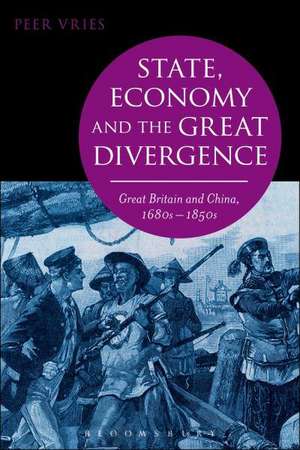State, Economy and the Great Divergence: Great Britain and China, 1680s-1850s
Autor Peer Vriesen Limba Engleză Paperback – 25 feb 2015
| Toate formatele și edițiile | Preț | Express |
|---|---|---|
| Paperback (1) | 246.48 lei 6-8 săpt. | |
| Bloomsbury Publishing – 25 feb 2015 | 246.48 lei 6-8 săpt. | |
| Hardback (1) | 896.82 lei 6-8 săpt. | |
| Bloomsbury Publishing – 25 feb 2015 | 896.82 lei 6-8 săpt. |
Preț: 246.48 lei
Preț vechi: 277.34 lei
-11% Nou
Puncte Express: 370
Preț estimativ în valută:
47.17€ • 48.73$ • 39.26£
47.17€ • 48.73$ • 39.26£
Carte tipărită la comandă
Livrare economică 26 martie-09 aprilie
Preluare comenzi: 021 569.72.76
Specificații
ISBN-13: 9781472530226
ISBN-10: 1472530225
Pagini: 512
Dimensiuni: 156 x 234 x 28 mm
Greutate: 0.79 kg
Editura: Bloomsbury Publishing
Colecția Bloomsbury Academic
Locul publicării:London, United Kingdom
ISBN-10: 1472530225
Pagini: 512
Dimensiuni: 156 x 234 x 28 mm
Greutate: 0.79 kg
Editura: Bloomsbury Publishing
Colecția Bloomsbury Academic
Locul publicării:London, United Kingdom
Caracteristici
Synthesises and critically engages with the vast array of literature surrounding 'the great divergence'
Notă biografică
Peer Vries is University Professor at the Institute for Economic and Social History, University of Vienna, Austria.
Cuprins
Introduction1. Revenue2. (Over-)Expenditure 3. Finance and Money4. People5. The Military and the Economy6. Economic Policies7. Empire and Economy8. State-Building, Nation-Building and 'Legibility'Concluding RemarksAppendicesNotesBibliographyIndex
Recenzii
Vries' formidable book ... can be fairly described as a tour de force ... [Vries'] arguments are developed slowly and carefully, and supported by masses of evidence.
I agree with the basic truth of the contrast he [Vries] draws in state-building between early modern Europe and Qing China. Revisionist historians are essentially correct in asserting that political and economic institutions in Qing China were conducive to a Smithian dynamic of market expansion. But the Qing leaders' agrarian paternalist policies diminished rather than enhanced the extractive power of the state. In their efforts to enrich the people, Qing statesmen abjured interventionist state action. In contrast, Britain promoted a Schumpeterian dynamic of innovation and entrepreneurship harnessed to the goals of state-making and empire-building that ultimately propelled the breakthrough to modern economic growth.
Vries offers an important contribution to the debate about "The Great Divergence". His study is impressive in depth as well as scale ... A vivid and sharply-written book.
This book is an impressive economic comparison between Western Europe (especially Britain) and China during the long eighteenth century. It is a much needed and balanced account that tries, I think on the whole successfully, to not succumb to either a Euro-centric or China-centric interpretation. It engages with all the main themes pertinent to such a history but, ultimately, its originality lies in emphasising the Western European, particularly Britain's, form of state. The ability to raise revenues to fund expensive wars and colonial expansion has a ramification that, ultimately, is the primary key to the "Great Divergence" with China.
Peer Vries turns traditional political economy on its head: instead of an open, laissez-faire British economy confronting an oppressive and centralized Imperial state in China in the 18th century, Vries shows us a fiscal-mercantilist Britain extracting enormous taxes and a decentralized and inefficient Chinese government receiving rather few. Moreover, Vries argues that British industrial success arose because of - not in spite of - Britain's high taxation supporting an aggressively mercantilist and imperialist state. This deeply learned book will challenge both traditionalists' and "California School" revisionists' view of the Great Divergence; it marks a powerful new turn and major advance in understanding the origins of modern economies.
Professor Peer Vries' new book is a continuation of his decade-long pursuit for a better answer to a cluster of puzzles associated with the 'Great Divergence' that set Western Europe and China historically apart. Unlike the conventional views that look at a wide range of variables such as natural endowments, population, factor productivities, market activities, real wages and GDP, the author identifies the state as the prime mover in Eurasian history. The rise of the West was thus a result of a pushy 'visible hand' that dictated the allocation of key resources. He also probes further into the process and mechanisms of state-building by the elite that held political, ideological, legal, economic and military powers. Thus, the seed of the Great Divergence was planted by the elites in Western Europe and China long before 1700 AD. Professor Vries's path-breaking work re-sets our debate in global history.
I agree with the basic truth of the contrast he [Vries] draws in state-building between early modern Europe and Qing China. Revisionist historians are essentially correct in asserting that political and economic institutions in Qing China were conducive to a Smithian dynamic of market expansion. But the Qing leaders' agrarian paternalist policies diminished rather than enhanced the extractive power of the state. In their efforts to enrich the people, Qing statesmen abjured interventionist state action. In contrast, Britain promoted a Schumpeterian dynamic of innovation and entrepreneurship harnessed to the goals of state-making and empire-building that ultimately propelled the breakthrough to modern economic growth.
Vries offers an important contribution to the debate about "The Great Divergence". His study is impressive in depth as well as scale ... A vivid and sharply-written book.
This book is an impressive economic comparison between Western Europe (especially Britain) and China during the long eighteenth century. It is a much needed and balanced account that tries, I think on the whole successfully, to not succumb to either a Euro-centric or China-centric interpretation. It engages with all the main themes pertinent to such a history but, ultimately, its originality lies in emphasising the Western European, particularly Britain's, form of state. The ability to raise revenues to fund expensive wars and colonial expansion has a ramification that, ultimately, is the primary key to the "Great Divergence" with China.
Peer Vries turns traditional political economy on its head: instead of an open, laissez-faire British economy confronting an oppressive and centralized Imperial state in China in the 18th century, Vries shows us a fiscal-mercantilist Britain extracting enormous taxes and a decentralized and inefficient Chinese government receiving rather few. Moreover, Vries argues that British industrial success arose because of - not in spite of - Britain's high taxation supporting an aggressively mercantilist and imperialist state. This deeply learned book will challenge both traditionalists' and "California School" revisionists' view of the Great Divergence; it marks a powerful new turn and major advance in understanding the origins of modern economies.
Professor Peer Vries' new book is a continuation of his decade-long pursuit for a better answer to a cluster of puzzles associated with the 'Great Divergence' that set Western Europe and China historically apart. Unlike the conventional views that look at a wide range of variables such as natural endowments, population, factor productivities, market activities, real wages and GDP, the author identifies the state as the prime mover in Eurasian history. The rise of the West was thus a result of a pushy 'visible hand' that dictated the allocation of key resources. He also probes further into the process and mechanisms of state-building by the elite that held political, ideological, legal, economic and military powers. Thus, the seed of the Great Divergence was planted by the elites in Western Europe and China long before 1700 AD. Professor Vries's path-breaking work re-sets our debate in global history.



















